- Home
- Q. Patrick
Death for Dear Clara Page 7
Death for Dear Clara Read online
Page 7
There was a recent abrasion on his chin, half covered by a rakish strip of adhesive tape. Timothy fixed upon it as the most potentially profitable conversational gambit.
“So you took it on the chin,” he said pleasantly.
Tolfrey looked up blearily and fingered his chin with remembered indignation.
“Took me off my guard,” he muttered thickly. “Didn’t expect John to turn nasty—not after all I had done for him.”
Timothy took an optimistic leap in the dark. “So John Smith got pugnacious, did he?”
“Say, young man, wha’d’ you know about this?” Tolfrey had become surprisingly alert. “And how did you know he was calling himself John Smith?”
Timothy’s lucky guess had brought him more than he had bargained for. After a second’s hesitation, he said:
“I was at Clara’s office this afternoon and she told me he’d been to see her. You know, it’s funny about that fellow. I used to know him well, but I never can remember his real name. It’s on the tip of my tongue, but …”
He paused, hoping that Tolfrey would oblige him with a second windfall. But the other man did not speak. He was staring at him with eyes that were keen with suspicion.
“I know you,” he said abruptly. “Know everyone in New York. Can’t fool me with a face. You’re Doc Trant’s son.” He paused, as though straining to remember something, then added sharply: “You’re a policeman, aren’t you?”
This sudden counter-attack took Timothy completely off his guard. In a flash he realized he had lost whatever ground he had gained before.
“A policeman?” he echoed, tugging desperately at his maroon tie. “You flatter me. I’m just a struggling poet. Slim volume, you know. At least, it’s not a slim volume yet but I’m hoping it will be with Clara’s help. That’s why I was round there this afternoon.”
“Oh, was it?” Tolfrey’s tone was skeptical.
“Yes. And she told me you’d been in this afternoon, too. You used the back entrance, didn’t you? That’s the way I always use.”
This time he scored a very definite hit. Tolfrey sat up stiffly, gazing at him in half incredulity.
“You mean to say Clara told you about back entrance? Always said no one but me … You—you must be great friend of hers.”
“Oh, yes,” said Timothy. “She not only helps me with my poetry. When I’m hard up, she’s very generous with cash.” His gray eyes were watching Tolfrey’s blue-veined face intently. “For instance, this afternoon there was a check for three hundred and fifty dollars.”
One can ride an unwilling horse just so far—and no farther. Timothy had obviously gone too far. The bewilderment in Tolfrey’s eyes had crystallized into something very like alarm. For a moment he sat there, his mouth half open. Then he burst into unconvincingly raucous laughter.
“Know what’sh wrong with you, young man? You’re drunk. That’sh what you are. Drunk!” He grabbed two more cocktails from a passing waiter. “Don’t believe you know John Smith, don’t believe you know Clara, don’t believe a damn thing you’ve said.”
He rose rather unsteadily.
“Can’t waste time talking to drunks,” he muttered. “Goin’ to find Clara, let her know I came. Then I’m quitting.”
Timothy watched Tolfrey’s ponderous retreat through the crowd of guests. Mrs. Van Heuten’s “oldest friend” had proved even more unaccountable than he had anticipated. That he was on his guard was obvious. It was obvious, too, that his conscience was far from clear.
But, felt Timothy, Mr. Tolfrey with all his evasions and half admissions had not acted quite like a murderer.
After a second’s hesitation, he slipped out into the hall. With a policeman’s instinctive flair, he located a telephone in a little alcove. Making certain he was not being overheard, he got Jervis on the wire.
“Listen, I talked to Tolfrey. He’ll be leaving this place any minute.”
“Barnes is waiting outside,” replied the inspector’s reassuring voice. “He’ll tail him. Get any dope?”
“Not much. Tolfrey’s cagey as hell. But he’s somehow tied up with that first visitor, and John Smith’s an alias. Offhand, I don’t think he murdered Mrs. Van Heuten, but he knows much more than he’s telling. In fact, I think he’s going to be our key man. Have Barnes watch him like a hawk. But no cross-examination yet. If we give him his head, I think he’s likely to do something interesting.”
Then Timothy added: “I’m going to let him know about the murder before he leaves. That might scare him into acting quickly.”
“Okay,” grunted the inspector. “And how about Her Royal Highness?”
“Her Royal Highness,” said Timothy grimly, “is a pleasure yet to come.”
He put down the receiver and moved out into the hall just in time to see Dane Tolfrey hurrying toward the front door.
“You didn’t find Clara, did you, Tolfrey?” he asked quietly.
The other man shot him a quick, uneasy look. “She isn’t here,” he said. “They tell me she’s detained at the office.”
“That’s what they told you, is it?” Timothy’s eyes were fixed on Dane Tolfrey’s heavy face. “Well, I just went to answer the telephone. It was the police, calling from the Literary Advice Bureau. They were reporting that Mrs. Van Heuten has just been found dead at her desk—murdered.”
Dane Tolfrey stood absolutely still. For a moment Timothy thought he could trace a slightly yellowish tinge in the floridity of his cheeks. Then, Dane Tolfrey did the last thing that Timothy would have expected. He broke, once again, into uproarious laughter.
“Clara murdered! ’S if anyone could murder Clara!” He turned abruptly, pointing a nicotine-stained finger. “As I said before, young man, you’re drunk. That’s what you are … fried to a fare-thee-well ….”
He swung to the door and slammed it behind him. Timothy could hear his laughter echoing along the passage outside.
Although it looked very much as though Patricia Walonska were going to renege on her invitation, Timothy rejoined the other guests who were still drinking cocktails and chattering in complete indifference to their hostess’ absence. After a final tour of the room, Timothy had decided to leave when there was a sudden lull in the babel of voices. Everyone was looking toward the door. Timothy turned and looked too.
Four women were moving into the room. Timothy recognized them immediately from their newspaper photographs. They were the Princess Walonska, Susan Hobart, Beatrice Kennet and Gilda Dawn.
The arrival of these four strikingly contrasted celebrities injected new life into the gathering. The other guests started to cluster around them like steel shavings irresistibly attracted by high-powered magnets.
And they were certainly putting on a good show for their respective publics, reflected Timothy. Patricia Cheney, sheathed in regal black, was giving a perfect imitation of a Romanoff princess receiving friends. Gilda Dawn, magnificently Hollywood with a scarlet bolero and black matador hat, irradiated glamour like a sub-tropical sunset, while Beatrice Kennet, sleek and smartly gamin, hurled witticisms here and there with the careless dexterity of a practicing pitcher.
But the detective in Timothy was most interested in Susan Hobart. Unlike her companions, the little multimillionairess from Ohio wore her poise a trifle uneasily. Timothy was an expert at detecting nervousness. He could sense it in the restlessness of her small hands and in the unnatural brightness of her eyes.
For one instant she was left standing alone. Timothy seized his opportunity and elbowed his way toward her. Mrs. Hobart, he could tell, was the weak sister in that quartet. She was his most likely bet.
“You’re Susan Hobart, aren’t you?” he asked pleasantly. “I met you somewhere. Do you remember where?”
“Why—er—no.” The pretty, doll-like face was a blank.
By a deft piece of strategy, Timothy managed to detach the girl from her companions on the pretext of finding her a cocktail. After a few minutes, she thawed sufficiently to explain that she was
staying with the Princess.
“You see,” she offered rather breathlessly, “the Prince had to go back to Europe last month. He’s buying up the old estate that used to belong to his ancestors. And as Patricia was alone she thought a few …”
Her voice trailed off. Timothy noticed that her eyes moved uncertainly toward the group which encircled the Princess. He lifted his cocktail.
“Well,” he said, “let’s drink to our absent hostess.”
The girl flushed, started and then raised her glass.
“I suppose,” continued Timothy, “you don’t know why Clara’s not here this evening?”
“N-no.” Mrs. Hobart’s eyes flickered. “I—I expect she’s busy at her office.”
“I expect she is. I was down there this afternoon myself, by the way. Clara told me you four ladies had dropped in to see her.”
“Susan, dear, won’t you introduce me to your friend?”
“You saw Mrs. Van Heuten after …?”
Susan Hobart’s tiny hand moved to her throat.
A cool voice sounded behind Timothy. He turned to see Patricia Walonska. She moved to Susan’s side, her eyes fixed steadily on his face.
“Oh, Princess,” the millionairess was faltering, “this is—is …”
“Trant,” offered Timothy blandly.
“Oh, yes. How silly of me! Mr. Trant.”
“Mr. Trant,” echoed Patricia icily. Then she laid her hand on Mrs. Hobart’s arm. “We’re having such an interesting discussion over here, Susan, you must …”
It was obvious that the Princess had come over for the express purpose of abducting Susan Hobart. Timothy did not intend to relinquish her without a struggle.
“But we’re having such a very interesting discussion here, Princess,” he said. “We were talking about Clara Van Heuten.”
Patricia wavered a moment. “Dear Clara,” she murmured noncommittally. “Such a charming person.”
“As I was saying to Mrs. Hobart,” continued Timothy, “Clara told me this afternoon that you four ladies had been to see her at the office.”
For a second, he thought he could detect a hint of surprise in Patricia’s eyes.
“Oh, yes?” she said.
And that was all.
There was an arid moment of silence. Then an effusive voice exclaimed:
“Oh, Patricia darling, here you are.”
Gilda Dawn had floated toward them. Behind her, a cocktail in each hand, strode Beatrice Kennet.
“God, what a party,” murmured the authoress. “Am I at it or am I writing it?”
Despite the seeming casualness of this maneuver, Timothy realized that the four women had deliberately rejoined forces. He was convinced now either that they shared some common fear or that they had come to Mrs. Van Heuten’s with a purpose which demanded unity.
They also made it plain that they had no use whatsoever for him. When he showed no signs of being frozen away, Beatrice Kennet stared at him without interest and remarked to no one in particular:
“Who is that shirt—a cocktail communist or just one of Clara’s literary by-products?”
“A very by-product,” said Timothy humbly, “who once had vague hopes that Clara Van Heuten would make me as productive as she made you.”
“Clara make me productive!” snorted Beatrice Kennet. “Heaven forbid that my pen children should have to depend on Clara for a midwife or wet-nurse.”
“I’m sorry,” said Timothy quietly. “I thought you were a client of hers. In fact, I thought all you ladies were. Clara told me that each of you brought her a story this afternoon.”
Casually, he exposed his cigarette case to the hostility of four pairs of eyes. “She gave me quite a dramatic account of it. Four beautiful women coming in together—with four black briefcases.”
The reaction to this remark was unexpectedly violent. Susan Hobart drew in her breath with a little gasp. Beatrice Kennet snatched a cigarette from her own case and brought it into vicious contact with a match.
Gilda Dawn took a step forward.
“She told you that …?”
Patricia Walonska took immediate control of the situation. But her voice was none too steady as she said:
“I wonder if you would get some—er—canapés, Mr. Trant.”
“Delighted.”
Timothy grinned—a sudden, amused grin. He had remembered Inspector Jervis’ request for fingerprints.
He hurried to the screened alcove where lay the half emptied dishes of canapés. After a moment’s reflection, he selected a small silver tray on which were set geometric pieces of toast covered with pâté de foie gras. He smeared the paste from one canapé gently over the under side of the tray, creating a slightly sticky surface. It was the best he could do with the materials at hand.
He returned to the four women who had seated themselves on a low divan.
“Service, Princess.”
He thrust the tray rather unceremoniously into Patricia Walonska’s ungloved hands. She chose the smallest canapé and waited for him to remove the tray.
“I think Miss Dawn would like one,” said Timothy as he ostentatiously occupied his own fingers with a cigarette case.
The Princess passed the silver dish to the Lotus Lady who dilated disdainful nostrils and handed it in turn to Beatrice Kennet.
“Gooze gizzards! Ugh!” snapped the authoress, giving the tray to Susan Hobart.
“It’s sticky,” exclaimed the young millionairess with a little cry of disgust.
“I’m terribly sorry. I’ll bring napkins.”
With what seemed like unnecessary care, Timothy retrieved the tray and hurried back to the alcove. There he poured all the remaining canapés onto another dish, wrapped napkins very tenderly around the tray and slid it under his coat. It made only the slightest of bulges. He picked up other napkins.
As he returned to the four women he decided that, until he could face them in his official capacity, it was a waste of time to use the oblique approach any longer. He would have to resort to shock tactics for the final move in his attack.
He crossed to the couch and handed the napkins to the four women. For a moment he watched them wiping their fingers. Then, very gravely, he said:
“I’ve just heard the most terrible thing about Mrs. Van Heuten.”
He paused as four pairs of eyes fixed him with sudden attention.
“Yes. The news has just come in that she died this afternoon in her office. It seems that the police suspect murder.”
There was a deep moment of silence, broken by a strangled cry. Susan Hobart had risen from the divan, her eyes staring in wide, transparent panic.
“It wasn’t mur …!”
She swayed and then fell back limp against the cushions.
“Susan!”
The three other women had turned toward her, instinctively defensive.
Timothy stood watching them. His eyes were hard—without sympathy.
“Don’t be alarmed,” he said. “It’s only a faint.”
VII
Half an hour later, Timothy hurried into Inspector Jervis’ office at headquarters. The inspector was waiting for him.
Timothy produced the tray. “The fingerprints,” he said.
“The Princess’?” asked Jervis.
“Not only the Princess, but her three girl friends’, too. Four of the most expensive and possibly the most dangerous sets of fingerprints in New York, Jervis. And handed you on a silver platter. They may not be clear but it was the only way I could get them at all.”
Jervis listened rather anxiously while Timothy recounted his spectacular if unproductive interlude with the four women.
“The chief’s tearing his hair out by the roots about those dames,” said the inspector. “It isn’t just the Princess. If we don’t watch our step with Gilda Dawn, we’ll have all Hollywood on our tails. Susan Hobart owns half Ohio. And as for that writer woman—if she felt like throwing off a little article about New York’s nit-wit cops, she’d
be syndicated in every paper in the country.”
He picked up the tray carefully. “I’ll have this sent up to the fingerprint department right away. Let’s put in a prayer none of them check with the ones on the knife.”
Together they went to the chief’s office. The chief himself was leaning over the desk, his keen eyes very worried.
Inspector Jervis gave a detailed account of his activities. He had started an inquiry as to whether any known crooks or sneak-thieves had been seen in the neighborhood of the Literary Advice Bureau; he was having questioned all the employees in the office building where the Bureau was situated; he was getting all the information obtainable on Mrs. Van Heuten herself and on her business.
The deceased’s next of kin was in Boston. Consequently, her strong box at the bank could not be opened until the following day. But he was going hell-for-leather after the will angle in the morning.
The chief turned to Timothy.
“Well, Trant, what do you think?”
Timothy told him about his tactfully unofficial cross-examination of Tolfrey and the four women.
“It’s all goddam complicated, sir,” he concluded. “And it ought to have been as easy as a sum in arithmetic. Both Tolfrey and Miss Price admit no one but the two of them and the regular secretary knew about the back entrance. No one could have committed the crime through the front way except the Princess and her gang, unless Miss Price is shielding someone. In other words, we should only have to consider the Princess’ party, Tolfrey, Miss Price and her sister who’s presumably out of the picture somewhere in northern Pennsylvania. Seven suspects. When you can narrow a case down to seven in the first few hours, you ought to be getting somewhere.”
“But surely,” put in the chief slowly, “we can count out Patricia Cheney and her friends, Trant? What possible motive could four headliners like that have?”
“God knows,” agreed Timothy. “But what motive could anyone have for murdering Clara Van Heuten who looks like being New York’s all time high in respectability? She just shouldn’t have been murdered. That’s part of what makes it cockeyed.”

 Death Goes to School
Death Goes to School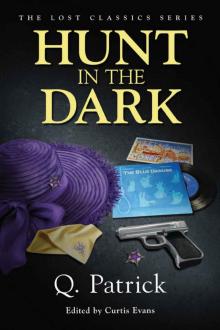 Hunt in the Dark
Hunt in the Dark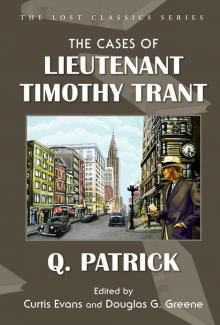 The Cases of Lieutenant Timothy Trant (Lost Classics)
The Cases of Lieutenant Timothy Trant (Lost Classics)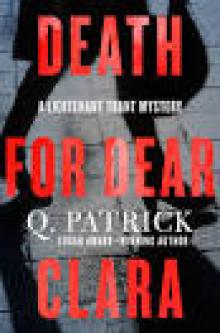 Death for Dear Clara
Death for Dear Clara S.S. Murder
S.S. Murder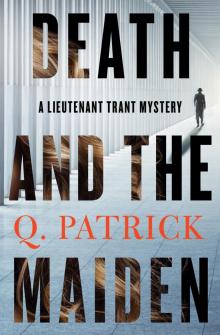 Death and the Maiden
Death and the Maiden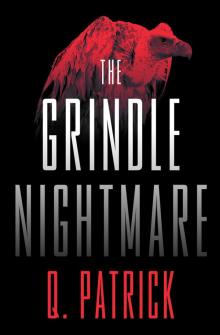 The Grindle Nightmare
The Grindle Nightmare Cottage Sinister
Cottage Sinister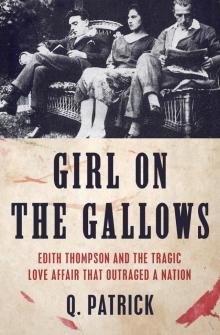 The Girl on the Gallows
The Girl on the Gallows